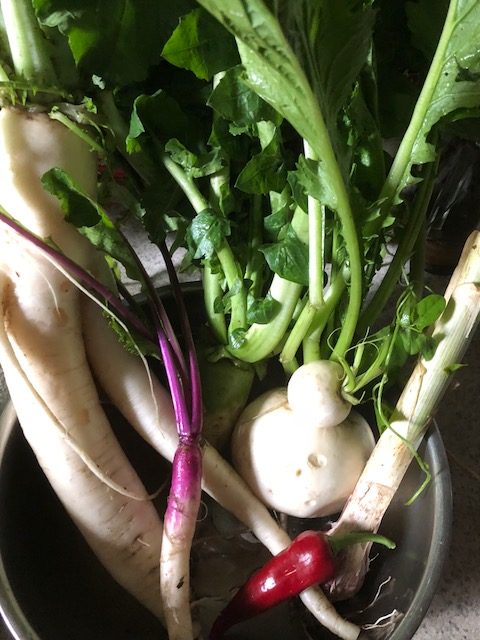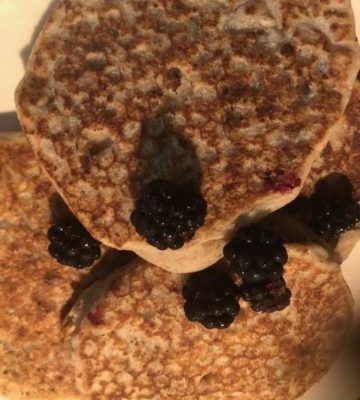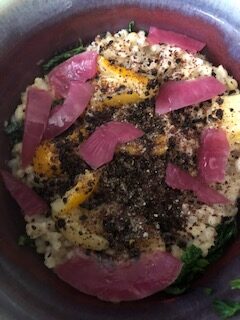When I say gut health, people listen. Why? Because many of us have tummy troubles. People tell me that when they travel their digestion usually gets disrupted. Some people get diarrhea, some get constipated, some people feel bloated or gassy. These can happen. So, here’s some gut education.
Few of us truly understand the gut and the role that it plays in our health. Only recently (in the past 10 years or so) have scientists done a deeper dive into the role of the microbiome and how it affects us – and not just our gut. You see your body is a semi-closed system. When one part gets out of balance, it affects other parts. Issue with your skin? Can your gut health affect your cardiovascular health and blood sugar? What about your gut-immune function? I say yes to all of this.
The Microbiome
The microbiome is the community of microorganisms, mostly bacteria, found in your gut (also in your mouth, vagina, if you have one, and on your skin. The gut microbiome is most well studied at this point.
This might sound like an infomercial. I would think so, too, if I weren’t a Registered Dietitian Nutritionist who has been focusing on helping people learn about the importance of gut health for the past ten years. Knowing about the microbiome, what it is, what it does and what it can do might help you radically shift your perspective on health.
Alexander Khoruts, MD, University of Minnesota, writes, “The intestinal microbiota, also commonly known as the “gut microbiome” is integral to human physiology and has wide-ranging effects on the development and function of the immune system, energy metabolism and nervous system activity.” Basically, your gut rules your body, and I will add: your mind, mental function and more.
What You Eat
The easiest and best place to start to impact your gut microbiome is with the foods that you eat regularly. Choose wisely as the diversity and variety of foods that you eat feed different gut microbiota (mostly bacteria).
Fiber Rich Plant Foods are Key

Eat a wide variety of fiber-rich plant-foods such as the following: (this list is not all inclusive, as all plant-foods likely help feed the “good guys”
Garlic, onion, leeks which are alliums which also include shallots, chives and green onions but there is less research on the latter group.
Green vegetables, which include asparagus, artichokes, okra, green peas, dandelion greens and possibly other greens such as kale and collards but no definitive information on the latter ones.
All mushrooms which should be cooked whether wild or domesticated.
Fruit, especially apples, berries with seeds such as blackberries and figs. Green banana flour is also a good source of prebiotics and it can be used in baking but I cannot tell you the effect that it will have on either taste or texture of your baked goods.
Nuts and seeds, especially chestnuts which have been studied for positive effects on gut health, as have nuts with skins such as walnuts and almonds.
Sea vegetables, especially kelp and kombu.
Roots such as Jerusalem artichoke, konjac which is found in shirataki noodles, jicama, burdock and yacon roots and chicory root which is often seen as inulin on packaged food labels.
About packaged foods: the more whole foods that you eat in their unprocessed form, the better.
The foods listed above contain prebiotics as the fiber that they contain is not easily digested so it passes through the small intestine into the large intestine where your bacteria can break it down into “food” for your gut.
Naturally Occurring Fermented Foods
Fermented foods come with their own good bacteria. Probiotics are live microorganisms, which when administered in adequate amounts, confer a health benefit to the host (that’s you).
While fermented foods are filled with bacteria from the fermentation process, they do not necessarily satisfy the scientific definition of a probiotic. That said, fermented foods and beverages are extremely nutritious and are great additions to your daily diet.
Eating fermented foods daily is recommended:
Here is a short list:
Yogurt of any kind with bacteria (but not the sugary kind as sugar tends to “feed” the bad bacteria, assisting in its growth), organic is best, miso, sauerkraut, kimchi, truly fermented pickles, natto, and possibly tempeh and kombucha plus a whole host of other fermented foods from around the world. The efficacy and potency of fermented foods varies but likely contribute to good gut health.
Foods for Good Health
I am quite sure that it is not a coincidence that many foods with prebiotic qualities are the same foods that are recommended by dietitians, doctors and others in health field as being important for heart health and blood sugar control. You have one body and we can’t separate out the parts. What’s good for one part is generally good for another. One big benefit of improved gut health is potentially an improvement in brain health and function. Your gut “talks” to your brain and vice versa. So pay attention to how you are feeling in each body part.
Keeping Your System In Balance
Your gut microbiome is complicated which is why we are still learning so much about it. I have simplified this for you. I feel confident suggesting that you eat as many different plant foods as you can tolerate: start low and go slow, if you don’t usually eat these foods. Drink plenty of fluid; I like water best, as fiber-filled plants need it to get through your system. Make this a delicious life.
As for traveling, the microbes in the soil and water, might cause your system to go awry. It’s a good time to consider taking a high quality probiotic product such as Seed’s Daily Seed Synbiotic which has a broad array of bacterial strains, and contains studied prebiotics and probiotics that have been shown in clinical and scientific studies to provide benefits for gastrointestinal function, gut barrier integrity, cardiovascular health, gut immune function, micronutrient synthesis and dermatological health.
What happens in your gut starts in your mouth, and ends, well, at the end of your digestive tract.
All opinions are my own #ad #accountable
The SEED Daily Synbiotic isn’t intended to diagnose, treat, cure or prevent any disease but might help support your gut health, though, of course, results vary.


My husband and I eat primarily (95%) whole food plant-based for about a year and still have a LOT of gas! We avoid oils, dairy, and processed foods, and I strive to have a broad array of vegetables and grains in our meals. Your suggestions would be greatly appreciated. Thank you
I have to apologize for my slow response. It sounds as if you and your husband need to work on getting your gut to work more efficiently, or to pay more attention to the food combinations that you are eating. Often, having a lot of gas is a sign that your GI system is unhappy.
Even though I don’t cook much – I always learn & enjoy your newsletter. Do you know anything about SIBO (small intestine bacteria overgrowth)? I’m too sensitive to lactose so fermented (natural) foods suggested by Stanford GI and to avoid OTC probiotic supplements. Again, the little cooking thing, I started drinking Kombucha drinks. Is that legit (pure) Kombucha or is authentic Kombucha something else? I love RLP over the holidays – lucky you! Thanks
I know a bit about SIBO. Until you get it cleared up, it’s best to avoid triggers, whatever they might be for you. If you do have SIBO, you might want to see a gastroenterologist who employs a dietitian who could help you sort things out.
IF you have SIBO, basically the bacteria are having a party in the “wrong” part of your gut.
The kombucha you want is refrigerated and not very sweet. Good luck.
RLP felt different this time. Missed seeing you.
Thank you Jill for all of the new information regarding health issues. Last month you had an article regarding Fragrance allergies. I have been suffering from this all my life but not one of the doctors I complained to could answer why I was having so much trouble with smells. I literally can hardly breath. I’m on a few inhalers but nothing works. Anyway, according to everything I have read on this subject it’s acute asthma. This runs in my family.
I have read your new articles as well. I only have the upper part of my stomach left due to a blockage in the lower stomach.
Good luck with everything Marilyn. Somehow doctors don’t ask all the questions about people and their lifestyle regarding fragrances and other potentially toxic things in their environment. The doctors barely have time to say hello, let alone ask about what you use in your home such as cleaners, laundry detergent, cosmetics, shampoo, etc. All of that matters.
Would you provide a list of foods to avoid to promote optimum gut health please?
The main things to avoid for gut health are processed foods, white flour, white sugar and foods without fiber. For some people, avoiding gluten-containing foods is also helpful.
The gut is a complicated place but this is a good way to start.
Thanks for sharing about Seed Synbiotic – started a subscription for my husband & I.
I do hope that it helps you, in general, and with whatever issue you may have. In my opinion, it is a top quality synbiotic formula. I love that they do science-based research.